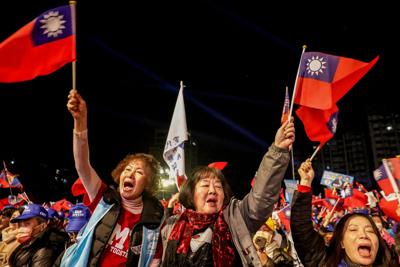Taiwan's presidential election isn't until Saturday, but already has implications for Canadians.
The outcome will influence the timing of China’s threat to annex Taiwan as part of Xi Jinping’s extreme nationalistic program of “national rejuvenation of the motherland.” That portends a military confrontation that could involve Canada and other allies as soon as 2027.
But more immediately, Taiwan's election reveals disturbing insights into the future of Beijing's voter interference in Canada.
Taiwan has been an ideal testing ground for China's powerful new AI, manipulating voters by flooding unprecedented amounts of disinformation into public and online discourse.
It was Beijing's meddling in Canada's last election that prompted the current Public Inquiry into Foreign Interference in Federal Electoral Processes and Democratic Institutions. Compared to methods that China used last time, the lesson from Taiwan for Canada is “you ain’t seen nothing yet.”
Taiwan has three presidential candidates: The Democratic Progressive Party (DPP) led by William Lai, the Kuomintang Nationalist Party (KMT) led by Hou Yu-ih, and the Taiwan People’s Party, a political vehicle for former Taipei mayor Ko Wen-je. The DPP has held power for eight years under President Tsai Ing-wen, who is constitutionally barred from a third term. There is popular dissatisfaction with the DPP, over issues that sound familiar to Canadians: energy policy, housing costs, shortcomings in transportation and education, and lack of progress on preschool day-care and elder care.
Regarding China, the DPP attitude is to stare down Beijing's threat of annexation, maintaining that Taiwan is de facto an independent nation and should be accepted by the world as such, including entry into such bodies as the Comprehensive and Progressive Trans-Pacific Partnership and the World Health Organization.
You might be interested in
Taiwan's other two parties prefer seeking reconciliation with China — including cultural exchanges and deepened economic integration — to build trust and mitigate China’s military and economic threat. As the KMT puts it, “This election is a choice between war and peace, if people want peace, prosperity, a corruption-free government and cross-strait stability, then vote for the KMT.”
Beijing openly wants the DPP displaced and the KMT returned to power. Last month a senior Chinese Communist Party official chaired a meeting of Chinese state and party agencies to support this end. The upshot so far: lifelike, computer-fabricated videos depicting candidates saying things they never said, or carefully edited clips of politicians saying things in unguarded moments they wish they hadn’t said.
China has also created a network of “Trojan horse” fake social media groups, purporting to support one party or another, that spew fake scandals and conspiracy theories to discredit the DPP. There is also evidence of individual citizens being tracked. For instance, if someone buys an ebook on Taiwanese politics, AI detects not only when the purchase was made but when the person is actually reading it. They are then micro-targeted with AI-generated messaging that undermines what they have just read.
Taiwan authorities have launched fact-checking websites to address disinformation in real time, but once a false allegation is made, the taint is never fully erased. And in a tight race — just three points separate Taiwan's two leading candidates — a little disinformation could make a massive difference.
Amidst such overwhelming information assaults, is Canada capable of confronting foreign interference in our own institutions? AI-enabled apps scrape previously insurmountable amounts of data in near real time, far faster than humans. They make data access targeting more precise, more effective — and harder to detect. Citizens who unknowingly digest social media content that is actually part of a disinformation campaign are more likely to make bad decisions, or decisions they wouldn't make if based on more legitimate information. This can have consequences for an entire nation, to the point of being the deciding factor in close elections.
Taiwan, realizing the alarming enormity of what is at stake, has spared no effort trying to protect the sanctity of its democracy from being fatally corrupted. This is exemplified by the exhaustive fact-checking websites that people are encouraged to use whenever they receive messages that seem dodgy.
Canada's turn is coming, and we must likewise tolerate no foreign interference in electing governments that guide the country on the world stage. Canada’s election outcomes should be determined by Canadians alone.












